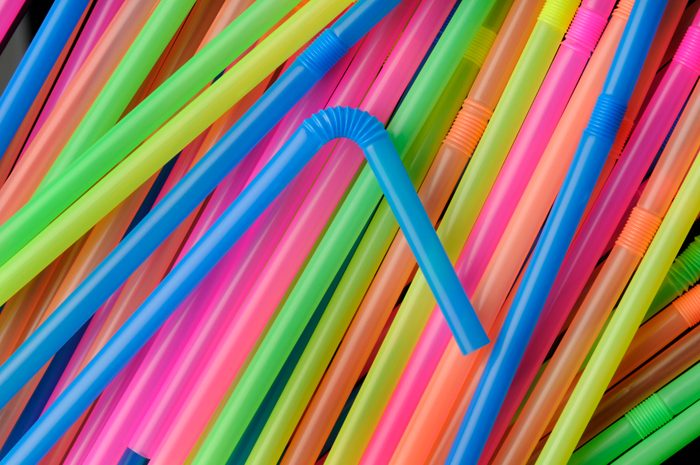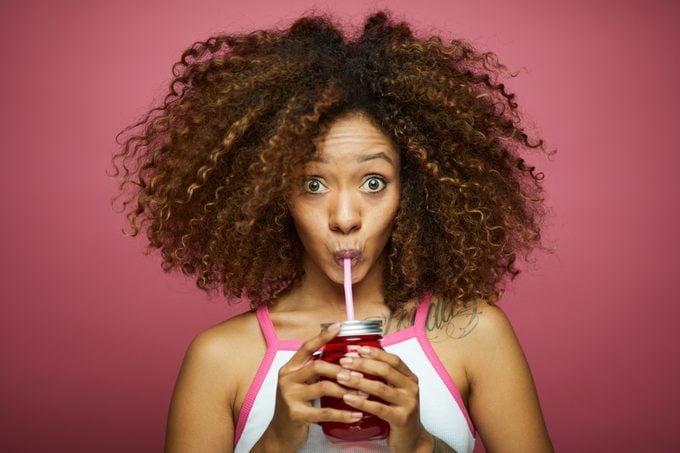Do Straws Actually Cause Wrinkles?
Updated: Mar. 16, 2023

Dermatologists weigh in on the common beauty concern.
There’s no shortage of beauty advice on TikTok. Whether you’re looking for an effective new workout or a way to tone your jawline while you sleep, someone has a tip for you. But as with many trends on the internet, these pointers often lack specific evidence or scientific backing. Moreover, they can lead to a sense of panic; viewers start wondering if they should be doing more to bolster their appearance, health or confidence. And while we all want to age gracefully, no one wants to spend precious money on bogus claims.
So, today, let’s focus on one recent beauty concern sweeping TikTok. Namely, that drinking out of straws can lead to wrinkles. If you’ve ever wondered how that iced coffee or smoothie habit may be affecting your beautiful face, this one’s for you! So, let’s dive into the basics: how wrinkles form, whether straws can contribute to them, what dermatologists think of this trend and how to minimize wrinkles in general.
How do wrinkles develop?
Most commonly, wrinkles develop as a result of the aging process and UV exposure, but some individuals may be more prone to developing wrinkles than others. Genetics definitely plays a role, as does the concentrated and repeated use of specific muscle groups. As Cutis Medical Clinics explains, “Contracting the same muscles over and over again can break down the collagen over time.” Collagen provides the skin with its elasticity, meaning that repeated muscle use can “lead to creases and fine lines, which may later turn into deep wrinkles.”
Do straws cause wrinkles?
The short answer is maybe. In an interview with Marie Claire magazine, celebrity esthetician and anti-aging guru Renée Rouleau explains, “When drinking out of a straw, the movement of the mouth area that you have to make will encourage the breakdown of collagen and elasticity more quickly, causing unnecessary wrinkles and lines. Drinking out of water bottles can also cause lines and wrinkles to form around the lips,” she says, particularly the sports varieties with a straw-like structure.
However, the impact of your straw-sucking habit will depend on numerous factors. As the Skimm points out, most of the TikTokers worrying about their straw habits are white, as white people are more likely to develop wrinkles due to their relative lack of melanin. Additionally, the consistency of straw use plays a major role in the development of lip wrinkles. If you are pursing your lips to drink from a straw all day, every day, that will have an effect, much like how smoking regularly or playing a wind instrument does.
OK, but can I still use a straw?

Yes, just don’t go overboard! According to Cutis, “You don’t necessarily have to avoid straws to avoid or prevent wrinkles. You can still sip from a straw from time to time, but make sure not to do it every single day or throughout the day.” Rouleau concurs and adds, “If you’re concerned about lines and wrinkles, you should drink directly from the glass.”
Should I get an anti-wrinkle straw?
To minimize the effects of consistent straw usage, some TikTokers have turned to a new straw that promises not to contribute to wrinkles. If you’re considering this purchase, slow your roll. According to dermatologist Scott Walter, MD, they may not be as foolproof as you’d hope. “Theoretically, yes, they may help,” he begins, “but you’d have to be someone who uses a straw like all day long, so you’re constantly sipping water or something else using a straw all throughout the day.” He continues, “If you’re occasionally using a straw, [this product is] not worth it.”
@denverskindoc #stitch with @isabelle.lux #lipwrinkles #perioralwrinkles #strawwrinkles #straw #skintips #dermtok ♬ original sound – Dr. Scott Walter | Skin Doctor
How can I prevent wrinkles?
Ah, the million-dollar question! Each skin expert has their own take on how to avoid wrinkles. Walter, for example, suggests using sunscreen daily and a retinoid at night. Cutis recommends using “lip line creams with antioxidants and peptides,” as well as Botox for more extreme cases. Rouleau reminds the audience that prevention is the best cure, explaining that collagen starts to break down around age 25: “You should start being more conscious around this time as preventing wrinkles is far easier and less expensive than trying to get rid of them once they appear.”
All of this is reasonable, solid advice. However, some treatments are more accessible than others and it’s important to consider exactly what funds and mental space you are willing to dedicate to wrinkle management. On a parting note, remember that developing wrinkles is a natural part of aging and not typically a skin health issue, but rather a cosmetic one. However you’d like to treat your wrinkles—or not!—is up to you, and you don’t need to live up to anyone’s beauty standards but your own.
Get The Healthy @Reader’s Digest newsletter and follow The Healthy on Facebook, Instagram, and Twitter. Keep reading: